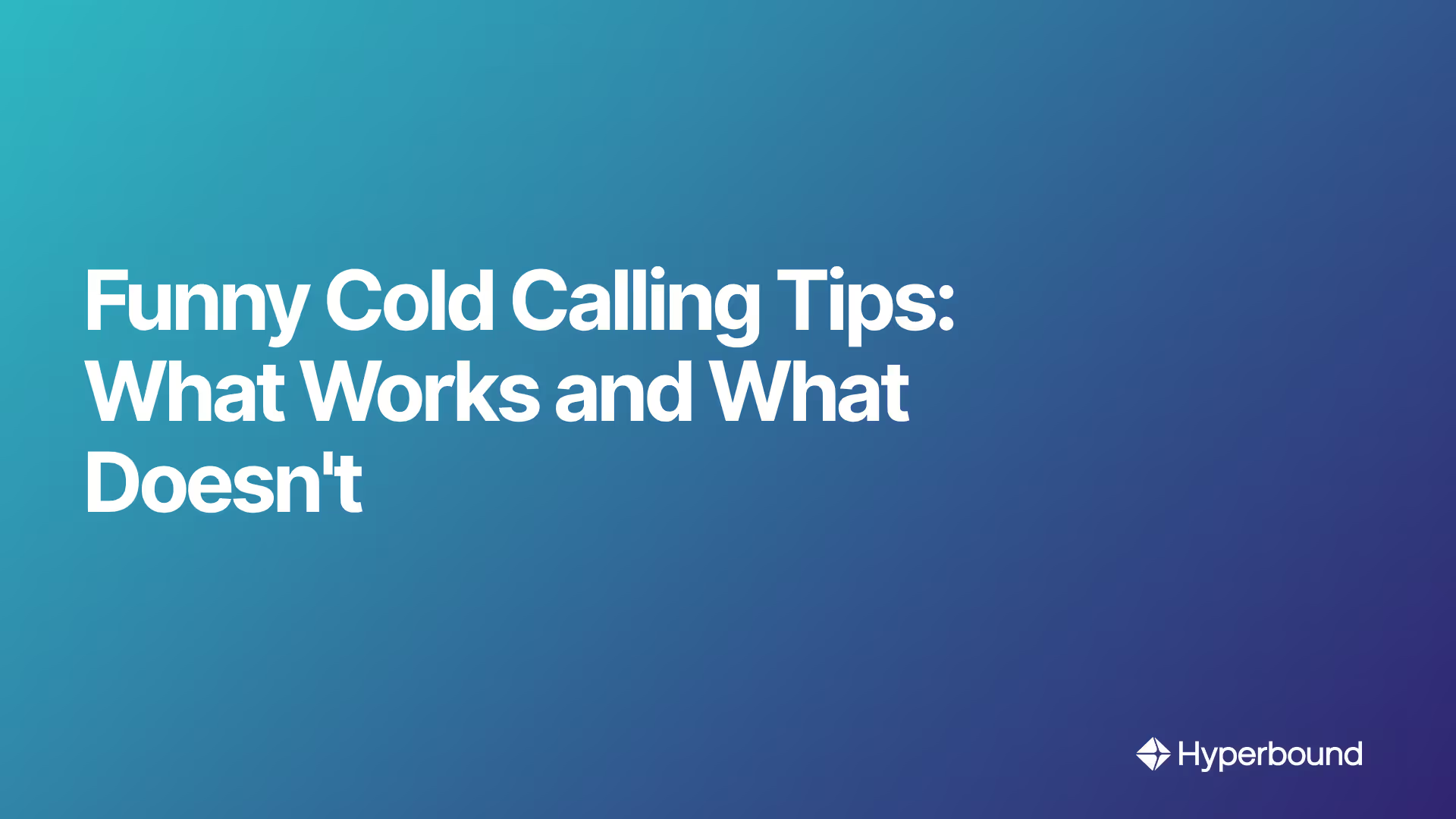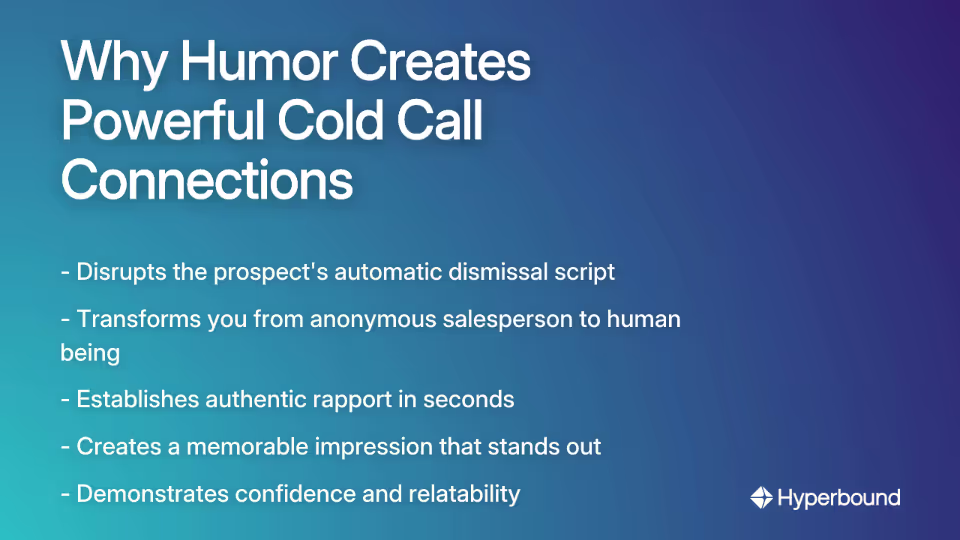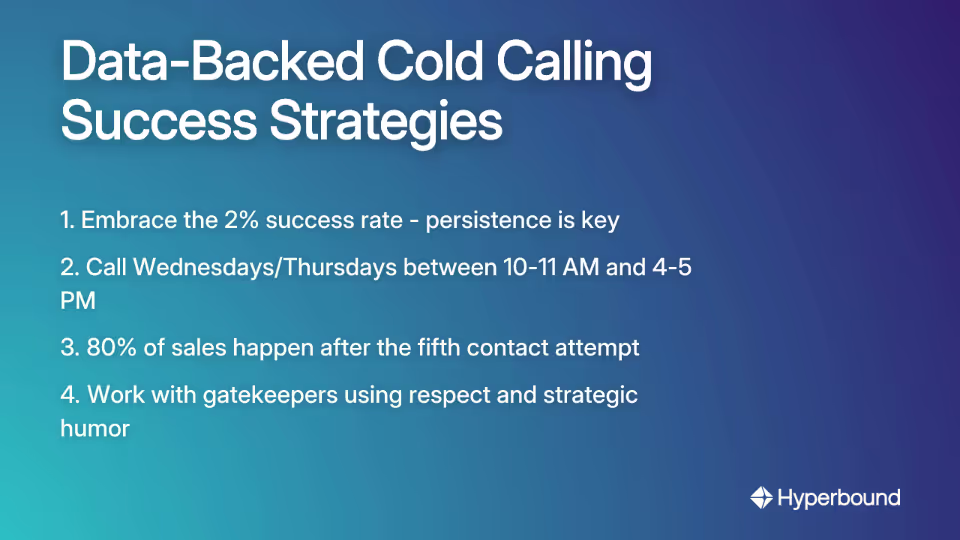
You've just dialed the phone for what feels like the hundredth time today. There's that familiar pit in your stomach as you wait through each ring, mentally rehearsing your opener. When that voice finally answers, you know you have mere seconds before they mentally check out—or worse, hang up. Should you play it safe with a standard business introduction? Or is this the perfect moment for that joke you've been workshopping?
Welcome to the eternal dilemma of the modern BDR: to joke or not to joke on a cold call.
The Uncomfortable Truth About Cold Calling
Let's face it—cold calls are often, well, cold as ice. If it were socially acceptable, many prospects would prefer to hang up immediately rather than listen to your pitch. The awkward silence, the rushed excuses, the occasional hostility—it's enough to make even seasoned sales professionals dread picking up the phone.
"I thought I was good, but was actually terrible," confesses one sales rep about their early cold calling days, describing the grueling experience of "200 calls for 3 hours" with little success to show for it.
Yet despite the digital revolution supposedly making cold calling obsolete, the data tells a different story. According to Freshworks, 57% of C-level executives actually prefer to be contacted by phone. Even more surprising, Zendesk reports that 82% of buyers accept meetings from sales calls, and 69% have taken calls from new providers in the last year.
Cold calling isn't dead—but the traditional, robotic approach might be. So where does humor fit into this equation? Is a well-timed joke your secret weapon or a fast track to end your career?
The Psychology of a Laugh: Why Humor Works in Sales
When a prospect answers your call, you have approximately 12 seconds to introduce yourself and capture their attention. That's barely enough time to state your name and company, let alone establish a meaningful connection.
This is where the "pattern interrupt" comes in. Prospects have a pre-programmed script for handling salespeople—usually involving quick dismissal. A surprising bit of humor disrupts this pattern, forcing them to engage in the present moment rather than defaulting to their standard "not interested" response.

But humor does more than just grab attention—it establishes rapport. When you can make someone laugh (even just a chuckle), you transform from "anonymous salesperson" to "real human being." In a world where prospects are bombarded with automated messages and AI interactions, your authenticity becomes your competitive advantage.
As one Reddit user puts it: "I try to meet them on a human level—not trick them into listening to me." Humor, when used correctly, is one of the most human connections we can make.
The "Genius Tactic": A Practical Guide to Using Humor Effectively
Rule #1: Master Self-Deprecating Humor
The safest and most effective form of humor in cold calling is self-deprecation. By poking fun at yourself, you demonstrate confidence, humility, and relatability all at once.
"I promise this isn't as awkward as the last cold call I made where I accidentally called my mom!" This type of opener works because it acknowledges the inherent awkwardness of the situation while showing you don't take yourself too seriously.
Self-deprecation creates an instant connection because everyone hates a know-it-all. By showing vulnerability, you signal that you're approachable and genuine, which addresses the common fear that building rapport will make you sound "slimy AF."
Rule #2: Crafting the Funny Permission Opener
The first few seconds of your cold call are critical. A humorous permission opener can disarm skepticism and earn you those precious extra minutes to deliver your value prop.
Take this example from a successful BDR on Reddit: "Hi Bill, it's Andy from Andy's Really Great Software. Do you have two minutes for me to tell you why I'm calling before you hang up the phone?"
This opener works brilliantly because it:
- Acknowledges the reality of cold calls
- Uses gentle humor about the prospect's desire to end the call
- Directly asks for permission to continue
- Commits to a specific, short timeframe
Another effective approach: "Hey [Prospect's Name], this is [Your Name] from [Your Company], and I'm not gonna lie, it's a cold call. But I promise to deliver value before your screen saver kicks in. Does that sound fair?"
Rule #3: Disarming Objections with a Smile
When facing resistance around a prospect's pain points, humor can defuse tension and keep the conversation flowing. One sales rep shares: "even laughing during the call when a prospect is becoming prickly has helped me move the conversation forward."
Instead of getting defensive when a prospect objects to your pitch, try a humorous analogy: "I get it, switching CRM systems can feel like a root canal, but it doesn't have to be that painful!" This acknowledges their concern while gently suggesting an alternative perspective.
Rule #4: Read the Room (No "One Size Fits All Script")
The most important rule of using humor in cold calls is understanding that there's "no one size fits all script." What cracks up one CTO might completely fall flat with another.
Listen carefully to your prospect's tone and adjust accordingly. If they respond with their own humor, you can continue the light-hearted approach. If they're all business, pivot quickly to a more professional tone. This adaptability is crucial for effective rapport window management.

The "Career Ender": Navigating the Pitfalls of Humor
While humor can be a powerful tool, it comes with significant risks that can derail your call—and potentially your career.
Pitfall #1: Crossing the Line
Some topics should never be joked about in a professional setting: politics, religion, personal characteristics, or anything that could be considered offensive. What seems harmless to you might be deeply off-putting to your prospect.
One sales rep shared a cautionary tale: "I called a prospect once, and after waiting with the receptionist, I finally got transferred over to the person I was looking for. Once I said hello he began to barrage me with insults out of frustration. It turns out he thought I was the Microsoft support rep he was waiting on."
This case of mistaken identity highlights how quickly calls can go sideways—even without intentionally using humor. Imagine how much worse it could be if you'd deliberately started with an inappropriate joke.
Pitfall #2: The Try-Hard Comedian
Remember, you're a BDR, not a stand-up comedian. Your primary goal is to identify pain points, present your value prop, and handle objections effectively—not to get laughs. When humor overshadows your message, you've lost the plot.
Using too many jokes can make you seem unprofessional or, worse, desperate. Humor should complement your sales strategy, not replace it.
Pitfall #3: Inauthenticity Kills the Call
Perhaps the most dangerous pitfall is forced humor that doesn't align with your natural personality. Prospects have finely-tuned "fake detectors," and nothing will trigger them faster than an inauthentic attempt at building rapport.
As one sales professional warns, "if you get overly concerned with trying to build rapport you'll sound slimy AF." Your humor must be genuine, or it will backfire spectacularly.
Beyond the Joke: Data-Backed Strategies for Cold Call Success
Humor is just one tool in your arsenal. To truly succeed in cold calling, you need to combine it with solid fundamentals:

- Embrace the numbers game: With an average success rate of only 2%, rejection is part of the process. Zendesk research shows the average salesperson needs eight call attempts to reach a prospect, so persistence is key.
- Time your calls strategically: Sales data indicates that Wednesdays and Thursdays between 10-11 AM and 4-5 PM are optimal for connecting with decision-makers.
- Focus on the follow-up: ProSalesConnection reports that 80% of sales happen after the fifth contact attempt. This is crucial context for the "racing to the yes" mentality—you're not looking for an immediate yes; you're starting a conversation.
- Work with gatekeepers, not against them: A little humor can help you navigate past gatekeepers, but always treat them with respect. They often have more influence than you might think.
Finding Your Balance
The most successful cold callers strike a delicate balance—they're professional but personable, prepared but flexible, and strategic but authentic. Humor can be the difference between being instantly forgotten and being memorable enough to earn that follow-up call.
When used thoughtfully, humor transforms the cold call experience from a dreaded intrusion to a welcome conversation. It humanizes you in a world of automated messages and generic pitches. It creates a brief moment of connection in an otherwise transactional interaction.
As the sales landscape continues to evolve, those who can master this balance—knowing when to joke and when to focus on business—will find themselves not just surviving in the world of cold calling but thriving in it.
Remember: When people know that you genuinely understand their challenges and can anticipate their needs, they'll reward you not just with laughter, but with their business.
Frequently Asked Questions
Why is humor effective in cold calling?
Humor is effective in cold calling because it acts as a "pattern interrupt," breaking through a prospect's automatic dismissal of salespeople. A well-placed, genuine joke can disarm the prospect, transform you from an anonymous seller into a memorable human, and establish authentic rapport within seconds. This initial connection makes them more receptive to hearing your value proposition.
What is the best way to start a cold call with humor?
The best way is to use a self-deprecating or permission-based funny opener that acknowledges the awkward nature of a cold call in a relatable way. For example: "Hi [Name], this is [Your Name], and I'm not gonna lie, it's a cold call. But I promise to deliver value before your screen saver kicks in. Does that sound fair?" This disarms the prospect, shows you don't take yourself too seriously, and respectfully asks for their time.
What kind of humor is safest to use in sales calls?
Self-deprecating humor is by far the safest and most effective type of humor for sales calls. By poking fun at yourself or the situation (like the awkwardness of cold calling), you appear confident, humble, and relatable. This avoids the risk of offending the prospect, which can easily happen with jokes about other people, politics, or sensitive topics.
When should I avoid using humor on a cold call?
You should avoid humor if the prospect's tone is strictly professional, rushed, or annoyed from the start. The key is to "read the room" and adapt. If your initial friendly tone isn't reciprocated, it's best to pivot to a more direct, business-focused approach. Never use humor when discussing sensitive topics, and always avoid jokes about politics, religion, or personal characteristics.
How can I use humor without sounding unprofessional or slimy?
To avoid sounding unprofessional, ensure your humor is authentic to your personality and complements your sales pitch rather than overshadowing it. The goal isn't to be a stand-up comedian but a personable expert. Forced or inauthentic jokes trigger a prospect's "fake detector" and can make you sound slimy. Stick to light, self-deprecating humor that serves a purpose: to build a quick, human connection before getting down to business.
What if my joke doesn't land?
If your joke doesn't land, don't panic or draw attention to it. The best course of action is to seamlessly transition back to the purpose of your call. Simply move on with your opener, for example: "Anyway, the reason I'm calling is..." This shows confidence and professionalism. Remember, the joke is just a tool to break the ice, not the main event.
Is cold calling still effective?
Yes, cold calling is still highly effective, especially for reaching high-level decision-makers. Data shows that 57% of C-level executives prefer to be contacted by phone, and 82% of buyers have accepted meetings that originated from a sales call. While the method of cold calling has evolved away from robotic scripts, the channel itself remains a powerful way to start valuable business conversations.

Book a demo with Hyperbound
.png)













